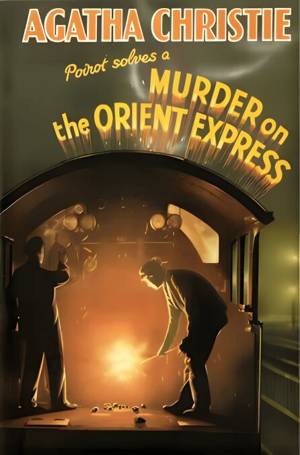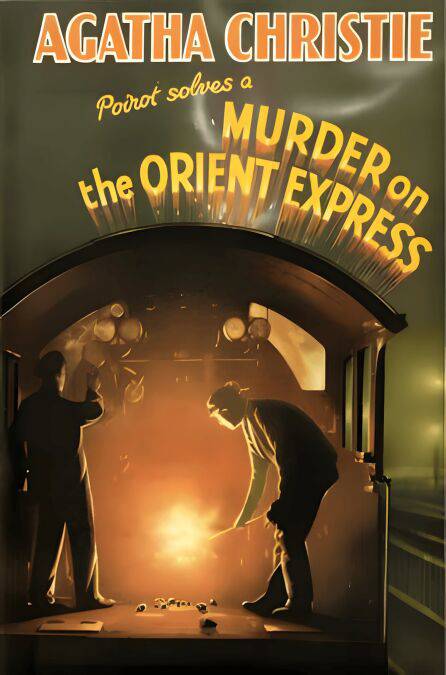
Je cadeautjes zeker op tijd in huis hebben voor de feestdagen? Kom langs in onze winkels en vind het perfecte geschenk!
- Afhalen na 1 uur in een winkel met voorraad
- Gratis thuislevering in België vanaf € 30
- Ruim aanbod met 7 miljoen producten
Je cadeautjes zeker op tijd in huis hebben voor de feestdagen? Kom langs in onze winkels en vind het perfecte geschenk!
- Afhalen na 1 uur in een winkel met voorraad
- Gratis thuislevering in België vanaf € 30
- Ruim aanbod met 7 miljoen producten
Zoeken
Omschrijving
"Murder on the Orient Express" is a classic detective novel penned by Agatha Christie, first published in 1934. This thrilling mystery introduces Christie's iconic detective, Hercule Poirot, as he embarks on an extraordinary journey on the luxurious Orient Express train.
The story unfolds as the train becomes snowbound in the Balkans, stranding its passengers. During the night, an American businessman named Samuel Ratchett is found murdered in his compartment. With no means of escape for the culprit, Poirot, who is also a passenger on the train, is called upon to solve the baffling murder case.
Poirot meticulously examines the evidence and interrogates the passengers, discovering that Ratchett was a notorious criminal whose real name was Cassetti. He had been responsible for a heinous crime years earlier—a kidnapping and murder case involving a young girl named Daisy Armstrong, which had tragic consequences for her family.
As Poirot investigates, he uncovers the interconnected pasts of the passengers, revealing secrets, hidden identities, and motives intertwined with the tragic Armstrong case. The plot thickens as multiple passengers are implicated in the crime, creating a complex web of suspicion and conflicting testimonies.
With his unparalleled deductive skills, Poirot meticulously pieces together the clues, applying his "little grey cells" to solve the enigmatic murder. In a dramatic and iconic denouement, Poirot presents two solutions to the crime—one that adheres to the conventional investigation and another that delivers a different form of justice, leaving readers pondering the moral complexity of the case.
"Murder on the Orient Express" is celebrated for its intricate plotting, compelling characters, and the brilliant deduction skills of Hercule Poirot. The novel's surprise ending and moral dilemma continue to captivate readers, making it one of Agatha Christie's most famous and enduring mysteries.
The story unfolds as the train becomes snowbound in the Balkans, stranding its passengers. During the night, an American businessman named Samuel Ratchett is found murdered in his compartment. With no means of escape for the culprit, Poirot, who is also a passenger on the train, is called upon to solve the baffling murder case.
Poirot meticulously examines the evidence and interrogates the passengers, discovering that Ratchett was a notorious criminal whose real name was Cassetti. He had been responsible for a heinous crime years earlier—a kidnapping and murder case involving a young girl named Daisy Armstrong, which had tragic consequences for her family.
As Poirot investigates, he uncovers the interconnected pasts of the passengers, revealing secrets, hidden identities, and motives intertwined with the tragic Armstrong case. The plot thickens as multiple passengers are implicated in the crime, creating a complex web of suspicion and conflicting testimonies.
With his unparalleled deductive skills, Poirot meticulously pieces together the clues, applying his "little grey cells" to solve the enigmatic murder. In a dramatic and iconic denouement, Poirot presents two solutions to the crime—one that adheres to the conventional investigation and another that delivers a different form of justice, leaving readers pondering the moral complexity of the case.
"Murder on the Orient Express" is celebrated for its intricate plotting, compelling characters, and the brilliant deduction skills of Hercule Poirot. The novel's surprise ending and moral dilemma continue to captivate readers, making it one of Agatha Christie's most famous and enduring mysteries.
Specificaties
Betrokkenen
- Auteur(s):
- Uitgeverij:
Inhoud
- Taal:
- Engels
Eigenschappen
- Productcode (EAN):
- 9781998488520
- Verschijningsdatum:
- 17/08/2024
- Uitvoering:
- E-book
- Beveiligd met:
- Digital watermarking
- Formaat:
- ePub

Alleen bij Standaard Boekhandel
Beoordelingen
We publiceren alleen reviews die voldoen aan de voorwaarden voor reviews. Bekijk onze voorwaarden voor reviews.









